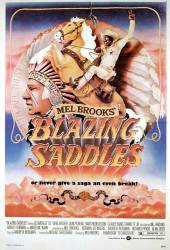Trivia: When Lamarr tells Le Petomane that his name is Hedley Lamarr and not Hedy, Le Petomane says that since it's 1874, Hedley could sue her. In 1974, actress Hedy Lamarr filed a lawsuit against Mel Brooks claiming the joke infringed on her privacy. The lawsuit was settled out of court.
Trivia: The language that the Indians speak is actually Yiddish. (00:39:55)
Trivia: The late Richard Pryor, who helped write the screenplay, was originally supposed to play Bart. However, his controversial stand-up comedy routines made it difficult to secure financing. Cleavon Little was eventually cast in Pryor's place.
Trivia: When Lyle requested that Bart and his friends sing a "good old n***er worksong", Burton Gilliam couldn't bring himself to say the N word because he really liked Cleavon Little. Cleavon took Burton aside and told him it was OK to say it because they weren't his words. Cleavon also joked that if he felt Burton would say those words to him in any other situation, they'd go to "fist city."
Trivia: The governor's name, Le Petomaine, means the "fartomaniac" or "Farting Maniac" in French. It references the stage name of French flatulist Joseph Pujol. (00:18:25)
Trivia: When this was first shown on American TV, the campfire scene was heavily dubbed over with horse whinnies in order to mask out the farting and not cause possible offence. (00:41:15)
Trivia: During a September 2017 interview on the BBC 4 Today programme, legendary comedian and comic filmmaker Mel Brooks was asked if he thought he could make some of his most famous films (such as "The Producers," "Blazing Saddles," and "Young Frankenstein") in today's over-sensitive, thin-skinned political climate. Brooks replied: "Maybe Young Frankenstein, but never Blazing Saddles, because we have become stupidly politically correct, which is the death of comedy. It's OK not to hurt the feelings of various tribes and groups. However, it's not good for comedy. Comedy has to walk a thin line, take risks. Comedy is the lecherous little elf whispering in the king's ear, always telling the truth about human behavior."
Trivia: Mel Brooks makes a "cameo" appearance in Blazing Saddles as State Governor William J. Le Petomane. This intentionally referenced French music hall artist, Joseph Pujol (1857-1945), who took the stage name "Le Petomane." He could break wind at his own will, and used this ability to play songs and extinguish candles on stage, becoming one of France's highest paid and most popular entertainers. However, while Blazing Saddles takes place in 1874, "Le Petomane" only made his stage debut in 1887.
Trivia: When Jim talks to Bart after his confrontation with Old Lady Johnson, Jim says, "You know? Morons." Cleavon started laughing because this line wasn't in the script. It was ad-libbed by Gene Wilder.
Trivia: As a "spoof", Blazing Saddles deliberately included some obvious errors. But one thing impressed me in this film. Saloon singer Madeline Kahn/Lili Von Shtupp sings "I'm Tired", accompanied by six musicians in an orchestra pit in front of the stage. In many westerns a saloon singer is backed by a full orchestra that cannot be seen (for example Marlene Dietrich/Frenchie in Destry Rides Again, whom Madeline Kahn is parodying). So, perhaps inadvertently, Mel Brooks actually got something right.
Trivia: As Sheriff Bart and The Waco Kid are first getting acquainted, The Kid demonstrates how fast he is by snatching a chess piece from the board before Bart can grab it. Even though Bart plainly captures the chess piece in both his hands, he is stunned to find the piece missing when he opens his hands again a moment later (all in the same shot). No special effects were necessary, because actor Cleavon Little used a simple tabletop magic illusion: As he clapped his hands together around the chess piece and drew it back from the table for a split second, he smoothly dropped the piece into his lap and then immediately opened his hands for the surprising reveal. (00:36:02 - 00:36:28)






Chosen answer: The opening line of the song refers to the Camptown Ladies and the phrase "Camptown Races" never appears anywhere in the lyrics. If nobody told him otherwise, Lyle may simply have assumed that some variation on "Camptown Ladies" was the actual title.
Tailkinker ★
The actual title of the song was "Gwine to Run All Night, or De Camptown Races," written by American lyricist Stephen Foster and first published in 1850. Over many years on the minstrel show circuit, the title was shortened to "Camptown Races" and was sometimes erroneously called "Camptown Ladies." While the phrase "Camptown Races" doesn't appear in the lyrics, the phrase "Camptown Racetrack" does appear in the second line: "Camptown ladies sing dis song, doo-dah, doo-dah, Camptown Racetrack five miles long, oh-de-doo-dah-day." The song refers to Camptown, Pennsylvania, a real town with a popular horserace in the mid-1800s.
Charles Austin Miller